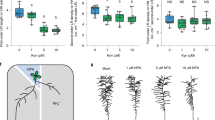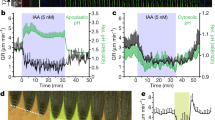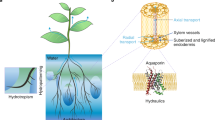Abstract
SINCE the article1 under the above title was published, we have obtained further biological evidence bearing on the mode of action of auxin. We carried out two root-growth experiments exactly similar to those of 23.3.56 and 21.4.56 (Tables 4 and 5, loc. cit.) but using 8-hydroxyquinoline and ethylene-diaminetetra-acetate instead of 3-indolylacetic acid and ethylenediaminetetra-acetate. Essentially similar results were obtained, that is, the inhibition of root growth caused by 10−5 M 8-hydroxyquinoline or 10−5 M ethylenediaminetetra-acetate alone was largely prevented by the presence of 10−11 M ethylenediaminetetra-acetate in the former case or of 10−11 M 8-hydroxyquinoline in the latter.
This is a preview of subscription content, access via your institution
Access options
Subscribe to this journal
Receive 51 print issues and online access
$199.00 per year
only $3.90 per issue
Buy this article
- Purchase on Springer Link
- Instant access to full article PDF
Prices may be subject to local taxes which are calculated during checkout
Similar content being viewed by others
References
Heath, O. V. S., and Clark, J. E., Nature, 177, 1118 (1956).
Author information
Authors and Affiliations
Rights and permissions
About this article
Cite this article
HEATH, O., CLARK, J. Chelating Agents as Growth Substances. Nature 178, 600–601 (1956). https://doi.org/10.1038/178600a0
Issue Date:
DOI: https://doi.org/10.1038/178600a0
This article is cited by
-
Effect of 2,4-dichlorophenoxyacetic acid on different metabolic types of bacteria
Bulletin of Environmental Contamination and Toxicology (1966)
-
Chelating Agents and Auxin
Nature (1964)
-
A relation between the ratios of phosphorus to iron and potassium to calcium in mustard leaves
Plant and Soil (1960)
-
Metal-Chelating Properties of Plant-Growth Substances
Nature (1959)
-
Evidence for a Protein Component in the Middle Lamella of Plant Tissue: a Possible Site for Indolylacetic Acid Action
Nature (1958)
Comments
By submitting a comment you agree to abide by our Terms and Community Guidelines. If you find something abusive or that does not comply with our terms or guidelines please flag it as inappropriate.



